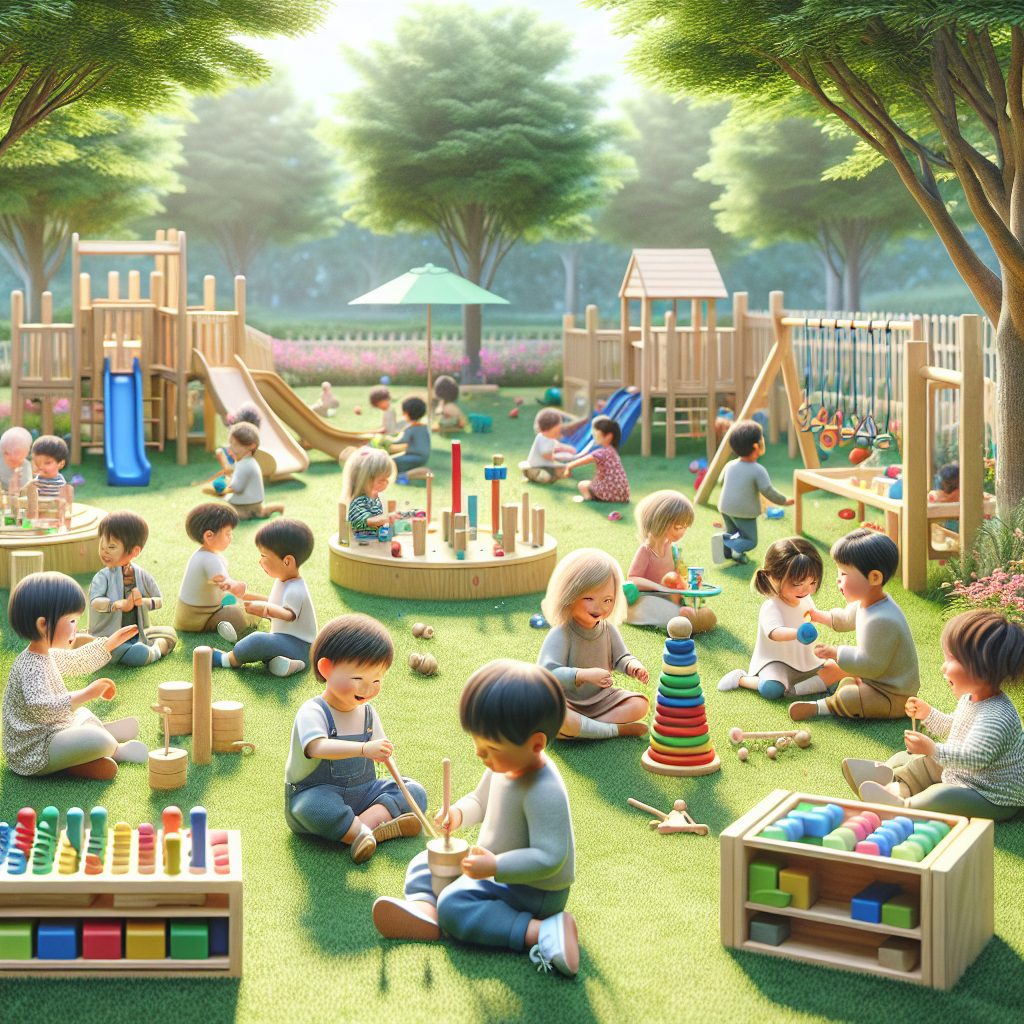Engaging Outdoor Play with Montessori Toys offers a unique approach to childhood development, fostering independence, creativity, and a love for the natural world. Derived from the educational philosophy of Maria Montessori, these toys not only captivate children’s imaginations but also provide them with valuable opportunities for exploration and learning. By promoting hands-on engagement with their environment, these toys encourage the development of essential skills and attributes, ensuring a holistic and enriching play experience.
One of the key impacts of engaging outdoor play with Montessori toys is the promotion of independent thinking and problem-solving skills. Unlike traditional toys that direct children’s play or offer predetermined outcomes, Montessori toys are designed to encourage open-ended exploration and experimentation. Whether it’s building blocks, gardening tools, or nature-inspired puzzles, these toys empower children to make choices, solve problems, and find their own solutions. This sense of autonomy not only builds their confidence but also nurtures their ability to think critically and adapt to different situations.
Moving forward, this article will explore the key takeaways when incorporating Montessori toys into outdoor play. We will discuss how these toys can foster a deeper connection with nature, facilitate the development of fine and gross motor skills, and cultivate a sense of responsibility towards the environment. By providing children with the tools and opportunities for engaging outdoor play, we can unlock their potential, fuel their curiosity, and pave the way for a lifelong appreciation for the world around them.
Key Takeaways
1. Montessori toys promote creativity and problem-solving skills in outdoor play by allowing children to explore the environment at their own pace and choose their own activities. These toys, such as building blocks and puzzles, encourage independent thinking and decision-making.
2. Engaging with nature through Montessori toys aids in the development of fine motor skills and hand-eye coordination. Playing with objects like shovels, buckets, and gardening tools helps children practice grasping, pouring, and manipulating objects, fostering the development of essential motor skills.
3. Outdoor play with Montessori toys enhances cognitive development by encouraging children to observe and interact with their surroundings. Toys that promote exploration and discovery, such as magnifying glasses and binoculars, stimulate curiosity and critical thinking abilities.
4. Montessori toys promote social and emotional development in outdoor play by encouraging collaboration and communication among children. Activities like playing in sandboxes or engaging in pretend play with others build important social skills and foster empathy and cooperation.
5. Montessori toys help children develop a deep connection and respect for the natural world. Through activities like gardening and caring for plants or animals, children develop an understanding of their role in the environment and develop a sense of responsibility towards the world around them.
What are the benefits of engaging outdoor play with Montessori toys?
Introduction to Montessori Toys
Montessori toys are educational materials designed to support the Montessori educational philosophy. These toys are specifically crafted to stimulate children’s curiosity, creativity, and independence through hands-on learning experiences. When used in outdoor play, Montessori toys can further enhance a child’s development and provide a range of benefits.
Promoting Physical Development
Engaging in outdoor play with Montessori toys allows children to actively explore their physical capabilities. Toys such as climbing frames, balance beams, and rope swings encourage the development of gross motor skills, coordination, and balance. These activities promote the strengthening of muscles, improvement of hand-eye coordination, and overall physical fitness.
Fostering Sensory Experiences
Montessori toys often incorporate elements that engage multiple senses, providing children with rich sensory experiences. In outdoor play, toys like sensory bins, sand and water tables, and nature exploration kits allow children to explore different textures, sounds, and sights. These sensory-rich activities stimulate their cognitive development and provide opportunities for deep exploration of the natural world.
Developing Problem-Solving and Critical Thinking Skills
Outdoor play with Montessori toys promotes problem-solving and critical thinking skills. Toys like building blocks, puzzles, and treasure hunts encourage children to think creatively, plan, and find solutions independently. Engaging in open-ended activities outdoors allows children to face challenges, make decisions, and learn from their experiences, leading to the development of resilience and problem-solving skills.
Promoting Social-Emotional Development
Engaging in outdoor play with Montessori toys provides children with opportunities to interact and collaborate with their peers. Toys like teamwork games, role-playing props, and cooperative sport equipment encourage social interaction, communication, and empathy. Through shared outdoor experiences, children learn to negotiate, take turns, and develop meaningful relationships with others.
Encouraging Curiosity and Love for Nature
Montessori toys often incorporate elements from nature, promoting a connection with the natural world. Toys such as bug catchers, gardening tools, and bird-watching kits pique children’s curiosity, fostering a love for nature and environmental stewardship. Engaging in outdoor play with these toys encourages children to explore the wonders of the natural environment, fostering a sense of wonder and respect for the world around them.
Conclusion
Engaging outdoor play with Montessori toys offers numerous benefits in children’s physical, sensory, cognitive, social, and emotional development. By providing rich learning experiences and opportunities for exploration, these toys contribute to holistic growth and support the principles of the Montessori educational philosophy.
How can you make outdoor play with Montessori toys more engaging?
1. Provide a variety of Montessori toys for diverse experiences
Offer a range of Montessori toys that cater to different interests and developmental stages. This ensures children have the opportunity to explore various skills and engage in activities that align with their preferences.
2. Create natural and inviting play environments
Design outdoor play spaces that incorporate elements from nature, such as grass, trees, and rocks. These natural elements provide a stimulating backdrop for play and increase children’s connection with the environment.
3. Encourage open-ended and child-led play
Allow children to freely play with Montessori toys, giving them the autonomy to make decisions and explore at their own pace. This promotes creativity, problem-solving, and a sense of ownership over their play experiences.
4. Offer opportunities for cooperative play
Foster collaboration and teamwork by providing Montessori toys that require children to work together. Involving multiple children in activities like building structures or solving puzzles promotes social interaction and the development of important social skills.
5. Integrate Montessori principles into outdoor play
Consider incorporating Montessori principles, such as freedom within limits and respect for individual development, into outdoor play. This can be achieved by providing child-sized tools, allowing children to choose their activities, and supporting their independence while maintaining a safe environment.
Frequently Asked Questions
1. What are Montessori toys?
Montessori toys are educational toys inspired by the Montessori method, which emphasizes hands-on learning, independence, and self-exploration. These toys are designed to promote engagement, creativity, and problem-solving skills in children.
2. How can outdoor play benefit children?
Engaging in outdoor play offers numerous benefits for children. It promotes physical fitness, boosts cognitive development, enhances social skills, and encourages a connection with nature. Outdoor play also helps children develop emotional resilience and stimulates their imagination.
3. How do Montessori toys encourage outdoor play?
Montessori toys encourage outdoor play by incorporating nature-based materials and open-ended designs. These toys inspire children to explore their surroundings, engage in imaginative play, and experience the sensory delights of the natural environment. They foster a love for outdoor activities and make learning enjoyable.
4. Are Montessori toys suitable for all ages?
Yes, Montessori toys are designed to cater to a wide range of age groups. These toys are available for infants, toddlers, and preschoolers, offering age-appropriate activities and challenges. Montessori principles can be adapted to suit different developmental stages, ensuring that every child can benefit from these toys.
5. How can I choose the right Montessori toy for my child?
To choose the right Montessori toy for your child, consider their age, interests, and developmental needs. Look for toys that promote hands-on exploration, open-ended play, and the development of specific skills. Reading customer reviews and seeking recommendations from Montessori educators can also be helpful in making a well-informed decision.
6. Are Montessori toys expensive?
While Montessori toys can vary in price, they are generally known to be more costly than mass-produced toys. This is because Montessori toys are often made from high-quality, natural materials, and are designed to be durable and long-lasting. Investing in Montessori toys can be seen as a worthwhile investment in your child’s educational development.
7. Can Montessori toys be used indoors as well?
Absolutely! Montessori toys can be used both indoors and outdoors. They are versatile and can support various learning environments. Many Montessori toys are designed to be portable and easily used in different settings, allowing children to continue their educational play experiences regardless of the location.
8. How do Montessori toys promote independence?
Montessori toys are designed to foster independence by encouraging children to explore and engage in self-directed learning. These toys often have a built-in control of error, allowing children to independently correct their own mistakes and learn from them. Montessori toys also focus on building skills at a child’s own pace, empowering them to take ownership of their learning journey.
9. Are Montessori toys suitable for children with special needs?
Yes, Montessori toys can be beneficial for children with special needs. The Montessori approach promotes inclusive education, allowing for individualized learning. Engaging with Montessori toys can support sensory development, fine motor skills, and cognitive growth in children with diverse abilities.
10. Can Montessori toys replace regular toys?
Montessori toys can offer unique educational benefits, but they do not necessarily need to replace regular toys. Combining Montessori toys with a variety of other toys allows for a well-rounded play experience. The key is to provide children with a diverse range of toys that stimulate different aspects of their development.
Final Thoughts on Engaging Outdoor Play with Montessori Toys
Engaging outdoor play with Montessori toys provides an incredible opportunity for children to discover, learn, and grow. By incorporating nature and open-ended play into their playtime, children can develop vital skills while forming a deep connection with the natural world. Montessori toys not only foster independent thinking and problem-solving abilities but also allow children to freely explore their surroundings and ignite their imagination.
Moreover, the benefits of outdoor play go beyond the academic realm. Outdoor play promotes physical well-being, allowing children to stay active, build strength, and develop gross motor skills. It also encourages social interaction and cooperation as children engage in imaginative play with their peers. The wonders of nature stimulate curiosity and creativity, nurturing a love for the environment and fostering a sense of responsibility for its preservation.
In conclusion, engaging outdoor play with Montessori toys offers a holistic approach to early childhood education. It encompasses physical, cognitive, social, and emotional development, all while nurturing a lifelong love for nature and fostering a sense of independence. By providing children with the opportunity to explore and engage with their surroundings, Montessori toys make outdoor play an enriching and meaningful experience for every child.

